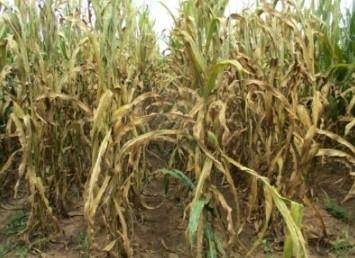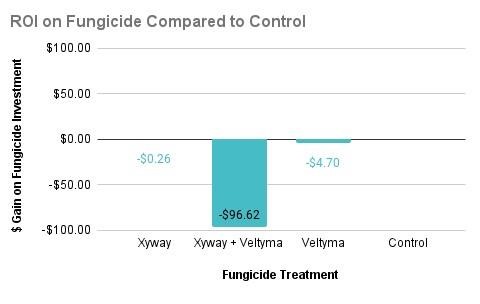By Jenny Carleo
Summary: Two separate research trials were performed by NC State Extension using Xyway LFR fungicide in the Piedmont of North Carolina in 2021. One trial was on silage and the other on grain corn. The use of Xyway LFR had neither a positive nor a negative effect on crop yield. 2021 was a dry year and disease pressure was minimal. These trials should be repeated in higher pressure years to reveal more information about Xyway performance under different conditions. There were no long-term negative effects on silage yield from using Xyway LFR at planting.
Silage Trial: This replicated trial was planted at the N.C. Department of Agriculture and Consumer Services Piedmont Research Station in Salisbury, NC on April 29, 2021, in a Lloyd clay loam with a no-till planter. Starter fertilizer (10-27-0) was used in both control and Xyway treated plots at a rate of 10 gallons/acre in-furrow. The variety planted was AgVenture AV3917YHB and is a dual-use 117-day variety. Seeding rate was 32,000 seeds/acre. Harvest was on August 12, 2021. Samples were sent to DairyOne for NDFD 30-hour and mycotoxin analysis. For the 30-hour analysis they measured forage quality for crude protein (CP), neutral detergent fiber (NDF) and dry matter (DM). This resulted in no significant differences between the treatments. No mycotoxins were seen in any of the samples.
The silage trial was conducted by Nancy Keith, Laura Elmore, Morgan Watts, Mackenzie Hall, and Jenny Carleo with support from Dr. Ron Heiniger, Ryan Heiniger, Ben Winslow, and the crew of the NCDA&CS Piedmont Research Station.
Grain Corn Trial: The grain corn trial was conducted by Agents Heather Schronce and Jenny Carleo. AgriGold A646-12VT2PRIB was planted on April 14, 2021, at 28,000 seeds per acre at ASR Grain in Shelby, NC. All treatments received 15 gallons of 32% UAN (53 units of N) via 2×2 at planting. The Xyway treatment was tank-mixed with the 2×2 starter fertilizer. Treatments were replicated 3 times (2 replicates were used in the data analysis). Commercial planting, spraying, and harvesting equipment was used throughout the study. The Veltyma treatment was applied at V10 on June 18, 2021, at 7oz/A. Harvest was on September 7, 2021. Grain weights for each plot were taken with the NC State weigh wagon accurate to 2 lbs. This season was very dry during critical periods of corn development which visibly reduced yield and increased plant stress. Grey Leaf Spot, Northern Corn Leaf Blight, and Southern Corn Leaf Blight incidence was minimal.
Germination Results: Stand counts were performed on May 12, 2021. The Xyway plots had 1.8% more plants germinated than the other plots. There was no distortion or stunting of plants in this 2×2 study in the Xyway plots. The increase in number of plants per square foot did not result in a yield benefit.
Yield Results: Average yield for this field was 134 bu/A, 56.2 lbs./bu test weight and 17.3% moisture. Applications of Xyway or Veltyma did not increase yield.

Crop Income: This graph shows the dollar amount of corn sold per acre at $4 per bushel for each of the treatments.

Return on Investment (ROI): The formula used to calculate ROI = [(Yield x $4/bu) – Cost of Fungicide]

There was no financial benefit of applying fungicides to corn in this trial in 2021. The cost of the fungicides exceeded the yield benefit of applying them. In our trial the Xyway + Veltyma treatment brought $96.62 less income than the control. This is because yield was reduced, and, expenses were higher, since two fungicides were applied instead of just one or none.
2021 was a year with low disease pressure for grain crops. This project should be repeated in a year with high disease pressure to reveal differences between treatments under those circumstances. Many thanks to the farmers and employees at ASR Grain in Shelby, NC for the research concept and work they did on this project with us.
FMC donated the Xyway product and paid for the silage analysis. All research tasks and data collection were performed exclusively by NC State University and N.C. Department of Agriculture and Services employees.
Source : ncsu.edu